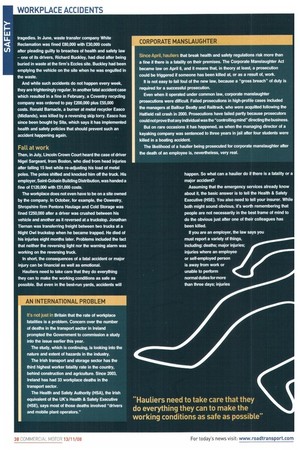CORPORATE MANSLAUGHTER
Page 38

If you've noticed an error in this article please click here to report it so we can fix it.
Since April hauliers that break health and safety regulations risk more than a fine if there is a fatality on their premises. The Corporate Manslaughter Act became law on April 6, and it means that, in theory at least, a prosecution could be triggered if someone has been killed at, or as a result of, wort.
It is not easy to fall foul of the new law, because a "gross breach" of duty is required for a successful prosecution.
Even when it operated under common law, corporate manslaughter prosecutions were difficult. Failed prosecutions in high-profile cases included the managers at Balfour Beatty and RaiItrack, who were acquitted following the Hatfield rail crash in 2000. Prosecutions have failed partly because prosecutors could notprove that any individual was the "controlling mind" directing the business.
But on rare occasions it has happened, as when the managing director of a kayaking company was sentenced to three years in jail after four students were killed in a boating accident.
The likelihood of a haulier being prosecuted for corporate manslaughter after the death of an employee is, nevertheless, very real.












































































































































































